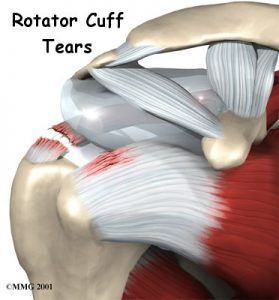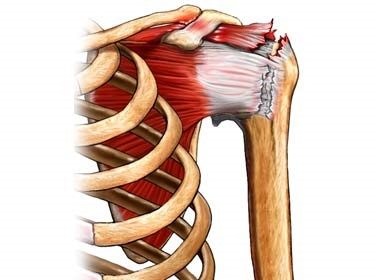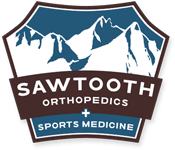Rotator Cuff Tear
The rotator cuff is a group of four muscles in the shoulder and upper arm. The muscles help to move the arm at the shoulder and also help to stabilize the joint. The muscles start on the shoulder blade and are connected to the shoulder bone by tendons, which are strong, flexible cords. Tendons may become damaged from long-term overuse or from injury.
A rotator cuff repair is a surgery to repair damage or tearing to the rotator cuff.
Symptoms
- Pain in the shoulder and arm, which varies depending on how serious the tear is
- Weakness and tenderness in the shoulder
- Difficulty moving the shoulder, especially when trying to lift your arm above your head
- Snapping or crackling sounds when moving the shoulder
- Inability to sleep on the shoulder
Most rotator cuff tears develop gradually (i.e. “degenerative”. But they also can happen suddenly — you might feel a pop, intense pain, and weakness in the arm (i.e. traumatic).

Reasons for Procedure
Your doctor may recommend this surgery for:
- A rotator cuff injury which does not respond to rest and physical therapy treatment
- A complete tear in the tendon
- Chronic pain and weakness from a partial tear in the tendon
Rotator Cuff Procedure
Dr. Tony completed an extra Fellowship year focusing on arthroscopic shoulder surgery.
Arthroscopic Surgery
A few small incisions will be made in the shoulder. A narrow tool called an arthroscope will be inserted through the incision. The scope has a tiny camera to allow the doctor to see inside. Other small instruments will be inserted through the other incisions. The doctor will use these tools to repair the tendon.
Open Surgery
The doctor will make a large cut in the skin over the shoulder. The torn tendon will be repaired and reattached and/or anchored with stitches. The incision will then be closed with stitches or staples.
Causes
You can get a rotator cuff tear by:
- Falling on your shoulder (i.e. Mountain biking or skiing)
- Using an arm to break a fall
- Lifting heavy weights or repetitive overhead exercises
Athletes prone to getting rotator cuff tears include:
- Baseball players, especially pitchers
- Swimmers
- Tennis players
- Football players



